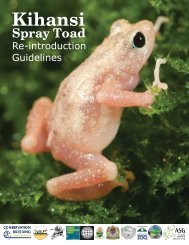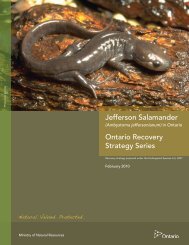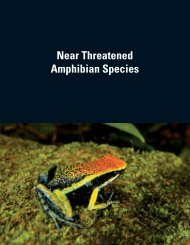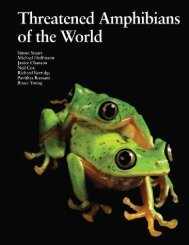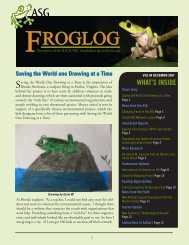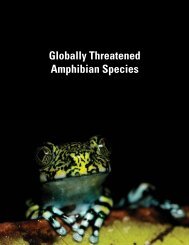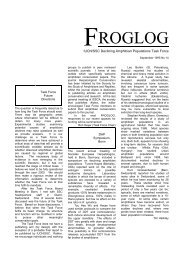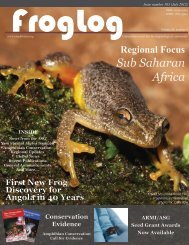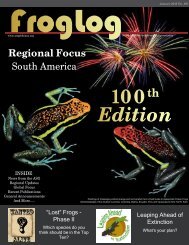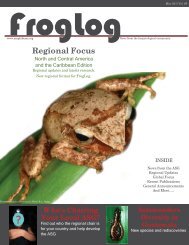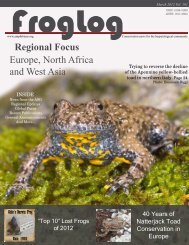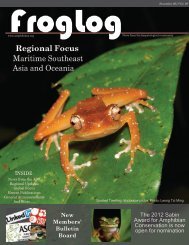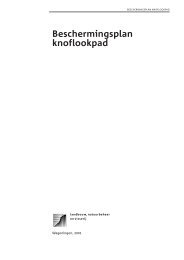download the PDF here - Amphibian Specialist Group
download the PDF here - Amphibian Specialist Group
download the PDF here - Amphibian Specialist Group
You also want an ePaper? Increase the reach of your titles
YUMPU automatically turns print PDFs into web optimized ePapers that Google loves.
herpetofaunal communities of lowland<br />
forests and midhills to environmental/<br />
landscape features, fragmentation and<br />
isolation, through field sampling, as well as<br />
analysis of existing information (museum<br />
specimens and published records), using<br />
logistic regression and linear multiple<br />
and/or multivariate regression models<br />
to relate species presence in forest<br />
patches, to specific forest patch features<br />
and isolation. We will study habitat loss<br />
and fragmentation (that potentially lead<br />
to isolation and stochastic extinction),<br />
through investigations of movements<br />
and microhabitat use of selected groups<br />
of amphibians and reptiles. Finally, we<br />
will study <strong>the</strong> effects of highways on<br />
herpetological communities through<br />
examination of phenology of roadmortalities<br />
and <strong>the</strong> effect of low frequency<br />
noise to <strong>the</strong> auditory performance of<br />
advertising amphibians.<br />
Anticipated benefits of <strong>the</strong> project would<br />
be answering <strong>the</strong> question whe<strong>the</strong>r<br />
<strong>the</strong> protected areas system protect<br />
representative herpetofaunal communities,<br />
creation of specimen-based herpetofaunal<br />
inventories of protected and o<strong>the</strong>r areas<br />
of western Sarawak, identification of key<br />
habitat features for species, improving<br />
habitat connectivity for long-term<br />
survival of populations, acquisition of<br />
species-specific ecological knowledge<br />
and understanding <strong>the</strong> effect of highways<br />
and vehicular traffic on communities, in<br />
order to make recommendations for <strong>the</strong><br />
persistence of herpetological populations<br />
for posteriority. Interested candidates can<br />
apply with a cv, with list of publications<br />
and names and e-mail contacts of 3<br />
referees to <strong>the</strong> undersigned.<br />
Prof. Indraneil Das, Institute of<br />
Biodiversity and Environmental<br />
Conservation, Universiti Malaysia<br />
Sarawak, 94300 Kota Samarahan,<br />
Sarawak, Malaysia. E-mail: idas@ibec.<br />
unimas.my Telephone (work): ++ 60 82<br />
581000 Handphone: ++ 60 128301208<br />
Fax: ++ 60 82 583004<br />
Funding Opportunities<br />
The Conservation Leadership<br />
Programs website provides a<br />
comprehensive overview of a large<br />
array of funding available http://www.<br />
conservationleadershipprogramme.org/<br />
O<strong>the</strong>rFundingOptions.asp<br />
The following information is kindly<br />
provided by <strong>the</strong> Terra Viva Grants<br />
Directory, for more information please<br />
visit: http://www.terravivagrants.org/.<br />
August<br />
New England Biolabs Foundation --<br />
International Grants. The Foundation<br />
supports conservation of biological and<br />
cultural diversity by making communitylevel<br />
grants for protected areas, ecological<br />
restoration, alternative livelihoods, and use<br />
of <strong>the</strong> arts to convey environmental and<br />
social messages. Geographical priorities<br />
are Belize, Bolivia, Cameroon, Ecuador, El<br />
Salvador, Ghana, Guatemala, Honduras,<br />
Nicaragua, Papua New Guinea, Peru, and<br />
Tanzania. Applicants are communitybased<br />
organizations, NGOs, and emerging<br />
support groups. The maximum grant<br />
is US$10 thousand. Applications must<br />
be preceded by a letter of inquiry (LOI).<br />
Application deadlines are 01 March and 29<br />
August. Link<br />
UK Natural Environment Research Council<br />
-- International Opportunities Fund.<br />
NERC announces grants of up to £300<br />
thousand for up to three years to support<br />
international research collaboration on<br />
issues such as climate change, biodiversity,<br />
and natural hazards. Priority partner<br />
countries include Brazil, China, India,<br />
and South Africa as well as a number<br />
of industrialized countries (see <strong>the</strong><br />
announcement). Each proposal requires<br />
substantial co-funding and/or in-kind<br />
support from <strong>the</strong> international partners.<br />
Prospective applicants must submit a<br />
declaration of intentions before 17 August<br />
2011. Link<br />
Weeden Foundation -- International<br />
Biodiversity Program. The Weeden<br />
Foundation makes grants for biodiversity<br />
conservation in forest ecosystems, riparian<br />
corridors, and riverine and aquatic<br />
environments of ecological importance.<br />
Weeden’s international geographical<br />
priorities are <strong>the</strong> Patagonia region of Chile,<br />
and <strong>the</strong> Altai Republic of Russia. The<br />
Foundation requests letters of inquiry<br />
(LOI) at least one month before proposal<br />
deadlines. (TVG Note: The Terra Viva<br />
Grants Directory apologizes for <strong>the</strong><br />
lateness of this posting.) The next deadline<br />
is 19 August 2011. Link<br />
September<br />
French Global Environment Facility<br />
-- Small Initiatives Program, First Call.<br />
The French Global Environment Facility<br />
(FFEM) announces Phase 3 of its Small<br />
Initiatives Program (PPI). The PPI<br />
supports local projects in biodiversity,<br />
climate change, and sustainable local<br />
livelihoods in Sub-Saharan Africa. Priority<br />
countries in Phase 3 are Burkina Faso,<br />
Cameroon, Dem Rep Congo, Ghana,<br />
and Togo. A lesser number of grants is<br />
available for o<strong>the</strong>r African countries. The<br />
average grant size is €35 thousand, with a<br />
maximum of €50 thousand. Applications<br />
are invited from civil society organizations<br />
in <strong>the</strong> eligible countries. Partnering<br />
international NGOs may be eligible under<br />
certain circumstances (see <strong>the</strong> guidelines).<br />
The application deadline for <strong>the</strong> first round<br />
of grants is 05 September 2011. Link<br />
October<br />
Buckminster Fuller Institute --<br />
Buckminster Fuller Challenge 2012. The<br />
Challenge is an annual prize of US$100<br />
thousand to invite ideas to radically<br />
advance human well-being and ecosystem<br />
health. Entries in prior years include<br />
several in energy, water, agriculture,<br />
natural disasters, etc., in developing<br />
countries. T<strong>here</strong> is a fee of US$100 to<br />
enter <strong>the</strong> competition. The deadline for<br />
submissions is 24 October 2011. Link<br />
Hongkong Bank Foundation -- Grants<br />
for Hong Kong and Mainland China. The<br />
If you have any funding opportunities that you would like announced in FrogLog, please send details to James Lewis at<br />
jplewis@amphibians.org<br />
FrogLog Vol. 98 | September 2011 | 53



